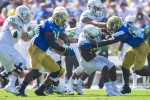It’s easy to see what the preseason poll voters were thinking when they ranked UCLA No. 7 to start the season.
Even now, after two losses and just one win by a comfortable margin, the Bruins only look like an elite team on paper.
They have the second most accurate quarterback in the nation in redshirt junior Brett Hundley. Their running back, redshirt sophomore Paul Perkins, has the twelfth most rushing yards. They have two semifinalists for the Butkus Award in redshirt senior inside linebacker Eric Kendricks and sophomore outside linebacker Myles Jack.
Looking at the individual stats shows just how much talent UCLA has.
Watching each game tells a different story: UCLA is less than the sum of its parts.
Last week’s 40-37 double overtime win over Colorado showed just that. By all accounts, the Buffaloes are not a good team. They’ve now lost their past seven Pac-12 games and haven’t had a season with more than one conference win since 2011 when they joined the Pac-12.
UCLA’s margin of victory in the first three years since Colorado joined the Pac-12: 39, 28 and 22.
UCLA’s margin of victory this year: 3.
Sure, every Football Bowl Subdivision team, even Colorado, is filled with scholarship athletes. But aren’t UCLA’s scholarship athletes better than that?
Even beyond the obvious stars, the Bruins’ roster is loaded with talent. Junior wide receiver Jordan Payton is on pace for one of the best seasons for a UCLA receiver in years. Sophomore nose tackle Kenny Clark looks like a surefire NFL player. Even the offensive line, which has had its fair share of criticism this year, is comprised of good individual players.
But put it all together and it’s clear something’s missing. A defensive front seven that features six potential NFL players has struggled mightily against the run at times this season; it allowed Colorado running back Michael Adkins II to rush for 107 yards after he totaled just 181 through the first seven games.
And an offense that features three of the top skill-position players in the Pac-12 was outscored 31-14 in the final three quarters of regulation against a Colorado defense that allowed the ninth-most points per game heading into the matchup.
At 6-2 on the year, the Bruins have still played well enough to keep their Pac-12 title hopes alive, but just barely; five of those six wins were decided by just one score.
To keep itself in contention in the Pac-12, UCLA will need a win over an Arizona team that is actually very similar to UCLA in one respect.
Just like the Bruins, the Wildcats (6-1, 3-1 Pac-12) are just barely sneaking past opponents in their wins. In a four-game stretch, Arizona beat University of Texas at San Antonio (2-6) by just three points, defeated Nevada (5-3) by seven, edged past Cal (4-4) by four points on a Hail Mary pass and upset Oregon (7-1) by seven. The next game, Arizona lost to USC (5-3) by two on a missed last-second field goal.
In terms of the close wins, the Wildcats’ season has been quite similar to the Bruins’, though their places in the rankings have followed inverse paths.
Even comparing the two teams’ stats, it’s clear that this matchup may be UCLA’s first against a truly equal opponent. And with the Bruins’ season on the line – needing a win to remain in Pac-12 South contention – Saturday’s game will be as good a test as any to see if they can finally play the way their individual talent would suggest.
